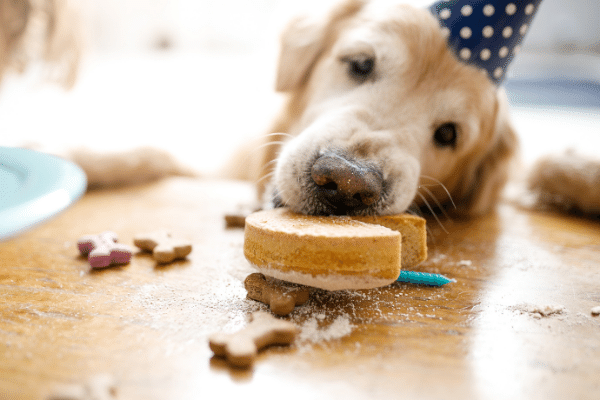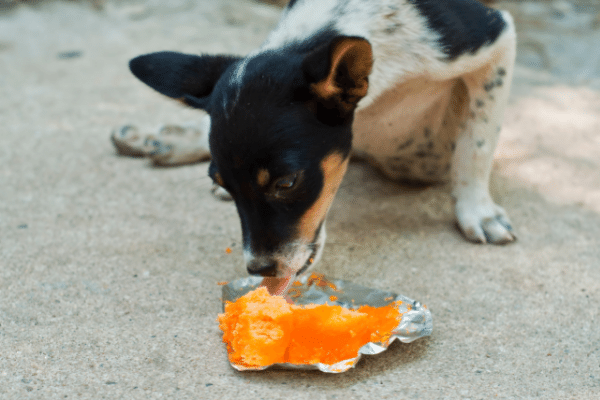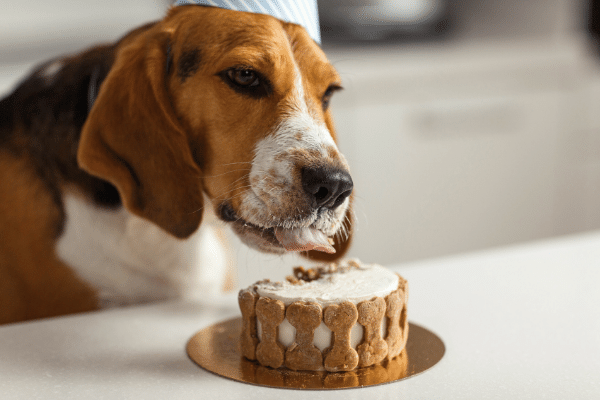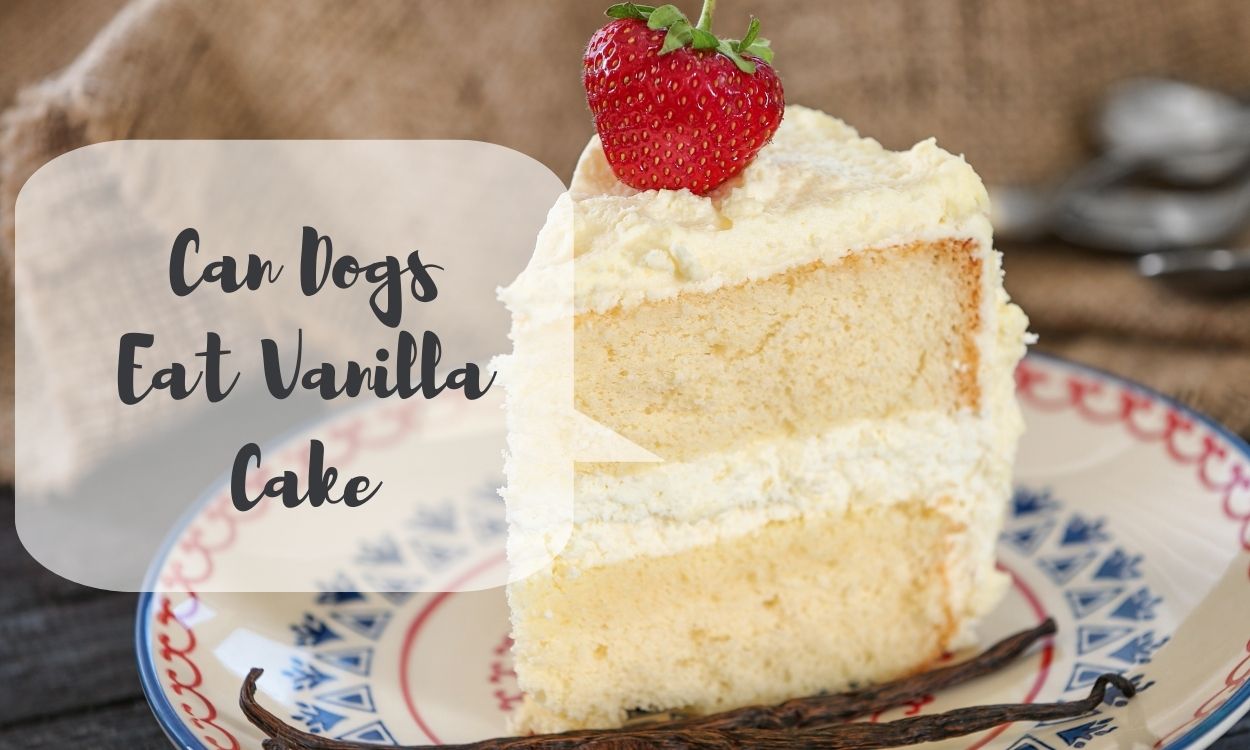Do you know what’s the second most expensive spice in the world after saffron? You guessed it right: it is vanilla! And there is hardly anyone who cannot resist vanilla cakes.
Has your dog gulped down a mouthful of vanilla cake from the previous day’s birthday party? Are you concerned about whether dogs can safely eat vanilla cakes or not?
Your search for such questions ends here. In this article, you will understand the possible effects of vanilla cake on your dog and whether or not it is safe for your furry friend.
Is Vanilla Cake Safe For Your Dog?

No. No. Vanilla beans and their extract are toxic to your four-legged furry friend. Unlike humans, vanilla cake and any other vanilla-based products are not safe for consumption by a dog.
Most pet owners do not give a second thought while giving vanilla cake to their pooch. It is because they believe vanilla cannot be as toxic to their dogs as chocolate. However, this is untrue.
What Are The Side Effects Of Feeding Vanilla Cake To Your Dog?

There are multiple reasons why you must not give vanilla cakes to your furry four-legged canine friend. You are most likely to notice the following side effects in your pooch after feeding him vanilla cakes:
- Weight-related Issues
Consumption of vanilla cake by your dog on a regular basis is a guaranteed road to abnormal weight gain. As sugars and fats are deposited in your dog’s body, he is most likely to face the problem of obesity.
Vanilla cakes do not only make your dog fat but also cause joint-related disorders. Obesity makes your furry friend more prone to cardiovascular risks.
Moreover, even scientific research has shown the close relationship between obesity and glucose intolerance in dogs. Not only this, but excessive weight gain gives birth to diabetes and arthritis.
- Dental Problems
Does your dog eat a lot of sugar-laden vanilla cakes? Then, unfortunately, you are in it for a whole lot of trouble. Bacterial infections, cavities, bad breath, and rotting teeth are some of them.
Unnatural foodstuffs such as vanilla cakes give rise to a wide range of dental problems in your dog. They include
- Removal of enamel
- Gum-related issues
- Holes in the teeth
- Teeth falling off the gums
Warning: Bacterial infections in your dog’s oral region can spread to his kidneys, liver, heart, lungs, and even brain, causing death in rare cases.
- Hazardous Toppings
Apart from sugar, several toppings used in vanilla cake are toxic to your pooch if consumed even in tiny amounts. The following items make the vanilla cake a dangerous sweet treat for your cute furry friend:
- Chocolate
- Coffee
- Macadamia nuts
- Raisins
- Nutmeg
- Grapes
- Candies
- Xylitol Poisoning
Are you also one of those pet owners who believe in the supremacy of sugar-free vanilla cakes? Because obviously, they do not contain sugar, right?
Sugar-free vanilla cakes contain xylitol, an artificial chemical sweetener commonly used as a substitute for sugar. It is used in edible products such as mints, chewable vitamins, gums, and vanilla cakes.
Unfortunately, xylitol is extremely toxic to pet animals, leading to a condition referred to as xylitol toxicosis in your canine friend.
Even a little amount of xylitol can lead to severe health hazards in dogs once ingested. It induces abnormal insulin release in your dog’s body, thereby reducing his blood sugar levels.
This condition is known as hypoglycemia which causes coma, weakness, incoordination, and even death in dogs.
Moreover, xylitol-rich vanilla cakes can cause liver damage in your dogs which will lead to the following symptoms:
- Lethargy
- Loss of appetite
- Excessive Vomiting
- Diarrhea
- Jaundice
- Death in rare cases
Can Vanilla Cake Cause Alcohol Poisoning In Dogs?

Vanilla extract is made with alcohol water; thus, it contains nearly 35% of alcohol. Not only this, the so-called ‘non-alcoholic’ vanilla extracts contain moderate amounts of alcohol.
Ethanol toxicosis in dogs, commonly known as alcohol poisoning, is a life-threatening condition for them. The following signs of alcohol poisoning are usually observed after your dog has eaten excessive amounts of vanilla cake:
- Vomiting
- Weakness
- Lethargy
- Disorientation
- Drooling
- Decreased respiratory rate
- A sudden drop in body temperature
Warning: You must immediately go to the nearest hospital if your dog shows any of the symptoms mentioned above. He might suffer from respiratory failure if not treated promptly.
FAQs
- Can dogs eat vanilla sponge cake?
Not at all. It would be best if you did not give vanilla sponge cake (or any other sponge cake for that matter) to your furry friend. It might not only cause vomiting and diarrhea but also trigger lactose intolerance in your dog.
Given the high amounts of sugar and carbs content, you must refrain from feeding vanilla sponge cake to your doggo.
- Can dogs eat vanilla cake without frosting?
No. Even if the vanilla cake does not have frosting, it will still contain harmful fats and sugar content.
So, if you do not want your dog to suffer from obesity, cardiac risks, and joint problems, avoid feeding him even a vanilla cake without frosting.
Conclusion
Vanilla cakes are as harmful to dogs as delicious they are to us. Therefore, you must not allow your dog to eat even a single slice of your vanilla cake.
In the article, we have made it clear that vanilla cake would give a trip to hell to your doggo’s tummy. His digestive system would collapse, and you would be in big trouble.
However, it is not as if your dog will die after accidentally licking a little amount of vanilla cake. But his bodily functions would surely go haywire if he consumed large amounts of vanilla cake. It would be best if you rushed to the vet in such cases.
Moreover, as an ideal dog owner, you must never incorporate a new food item without your vet’s advice.
Do you want to share the experience when your dog gulped down generous amounts of vanilla cake? How did you handle his adverse reactions? Let others know in the comments section below!

Dr. Aram Baker has been with Santa Clarita Animal Hospital since 1995 and his special interests include behaviour medicine and dermatology. He graduated from the Cleveland Humanities Magnet Program in Reseda, CA and attended California State University at Northridge where he received a Bachelor’s degree in biology. He went on to pursue his Doctorate in Veterinary Medicine at the University of California at Davis. He also spent time in the zoological medicine department at U.C. Davis during his Junior and Senior years. He is dedicated to caring for all pets big or small, young or old with compassion, patience, kindness, and love.
